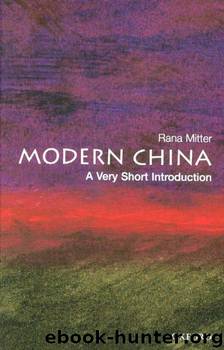Modern China by Rana Mitter

Author:Rana Mitter
Language: eng
Format: epub
Tags: China
ISBN: 9789085241522
Publisher: For the Benefit of Mr. Kite
Published: 2007-12-31T16:00:00+00:00
A modern politics?
A popular characterization of China’s leaders of the 20th century, particularly Mao, is that they have sought to become new emperors in their own right. Although it is a colourful shorthand, such a comparison is misleading. It highlights the exotic element of Chinese politics and conceals the reality that many of the assumptions and models that have shaped Chinese political thinking in the present century are profoundly modern, and indeed, similar to those in the West.
Chinese politics since the late Qing has been dependent on nationalism, an idea that derived its legitimacy from the people as a body in their own right, and an idea that a strong state would be a rational arbiter of power. It was based on mass politics where there was a social contract between government and citizen. While the Confucian mode of governance did also embody a sort of social contract between emperor and subject, it did not think it seemly that the people should be empowered in their own right – a profoundly non-modern way of thought. This does not mean that the Confucian past simply disappeared with the arrival of modern politics. For instance, assumptions that came from a modernized Confucianism did remain, such as ideas of hierarchy and mutual obligation. But these ideas have become adapted through contact with the assumptions of modernity about mass participation and legitimacy derived from the people, as well as the importance of the individuated self.
There is a final irony that has been implied, but not stated, in the way in which this chapter has portrayed politics since 1928 as a changing of the baton in a wider, consistent, politics of modernity. For the political form of China today – a one-party state that does still allow a significant amount of individual autonomy, a powerful state with a cooperative role in the international order, and a highly successful semi-capitalist economy in which the state and party still play a significant, embedded role – means that the Communist Party of today has essentially created the state sought by the progressive wing of the Nationalists in the 1930s rather than the dominant, radical Communists of the 1960s. One can imagine Chiang Kaishek’s ghost wandering round China today nodding in approval, while Mao’s ghost follows behind him, moaning at the destruction of his vision. The intellectual assumptions behind both the Nationalists and the Communists in the last century were similar in many important ways, making this seeming paradox perfectly comprehensible if examined in a somewhat longue durée that extends back before 1978 or 1949.
Download
This site does not store any files on its server. We only index and link to content provided by other sites. Please contact the content providers to delete copyright contents if any and email us, we'll remove relevant links or contents immediately.
| Arms Control | Diplomacy |
| Security | Trades & Tariffs |
| Treaties | African |
| Asian | Australian & Oceanian |
| Canadian | Caribbean & Latin American |
| European | Middle Eastern |
| Russian & Former Soviet Union |
The Secret History by Donna Tartt(19092)
The Social Justice Warrior Handbook by Lisa De Pasquale(12190)
Thirteen Reasons Why by Jay Asher(8912)
This Is How You Lose Her by Junot Diaz(6889)
Weapons of Math Destruction by Cathy O'Neil(6281)
Zero to One by Peter Thiel(5802)
Beartown by Fredrik Backman(5756)
The Myth of the Strong Leader by Archie Brown(5509)
The Fire Next Time by James Baldwin(5447)
How Democracies Die by Steven Levitsky & Daniel Ziblatt(5219)
Promise Me, Dad by Joe Biden(5154)
Stone's Rules by Roger Stone(5088)
A Higher Loyalty: Truth, Lies, and Leadership by James Comey(4964)
100 Deadly Skills by Clint Emerson(4926)
Rise and Kill First by Ronen Bergman(4790)
Secrecy World by Jake Bernstein(4753)
The David Icke Guide to the Global Conspiracy (and how to end it) by David Icke(4720)
The Farm by Tom Rob Smith(4514)
The Doomsday Machine by Daniel Ellsberg(4490)
